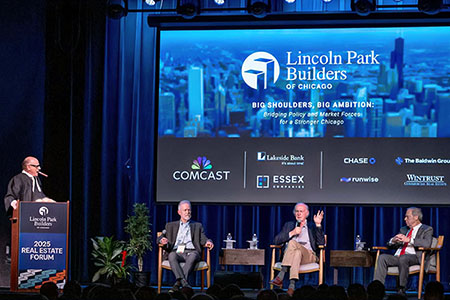2nd Ward Alderman Brian Hopkins, 42nd Ward Alderman Brendan Reilly, and 43rd Ward Alderman Michele Smith voted against the budget’s property tax increase.
Dec. 5, 2019 – Mayor Lori Lightfoot may have won her first budget battle, with the City Council passing her 2020 budget, but several North Side aldermen voted against it. 40th Ward Alderman Andre Vasquez said he “cannot in good conscience vote for a budget that increases the taxes our working families pay and fails to substantially improve our city services when the wealthiest residents and corporations in Chicago are not being asked to pay their fair share.” The $11.65 billion budget was approved by the City Council 39-11, but the mayor needed only 26 votes. Former Mayor Rahm Emanuel claimed the budget deficit would be just $252 million. That estimate was off by about $600 million. More than a third of the deficit came from higher required contributions to the city’s pension funds. Lightfoot’s budget closed an $838 million shortfall with a variety of new taxes, a small property tax increase, fee increases, government restructuring, elimination of job vacancies, and one-time accounting tricks. Freshman North Side aldermen who voted against the budget, besides Vasquez, include newly-elected 47th Ward Alderman Matt Martin of Lincoln Square and 49th Ward Alderman Maria Hadden of Rogers Park. The new aldermen said there was not enough money for mental health clinics and affordable housing, and that the budget did not target wealthy corporations with a head tax – a uniform tax imposed on each person – that Emanuel had eliminated.
Re-elected 43rd Ward Alderman Michele Smith of Lincoln Park voted against the budget’s property tax increase, saying she does not believe further property tax increases are the right way to raise the funds, as did 2nd Ward Alderman Brian Hopkins and 42nd Ward Alderman Brendan Reilly. The budget includes revenue from increased taxes on ride share companies and restaurants. It also includes consolidations and other cutbacks and savings. The uncertain parts of the budget include an estimated $200 million in savings by refinancing existing debt to achieve lower interest rates. Lightfoot’s budget proposes front-loading all these savings to the first year, rather than taking them over the course of the bonds’ lifetime, making this a one-time action that cannot be counted on in future years. Another $163 million comes from demanding higher reimbursement rates for emergency services, including $30 million from increased ambulance fees that require federal approval the city has yet to obtain. An additional $148 million in savings come from implementing zero-based budgeting for the first time, a budgetary practice through which every line item of spending is assumed to start at $0.00 and must be justified anew each year. While another $141 million comes from lower costs from unspecified “improved fiscal management.” The city also declared a $31.4 million surplus of funds in Tax Increment Financing districts. If the city has not spent all its available TIF funds, which are generally invested in community-improvement projects, the mayor can bring the money into the operating budget to be used for other purposes, as was done for 2020. Diverse opinions of budget among North Side aldermen One North Side alderman who supported the budget, 48th Ward Alderman Harry Osterman, said it was “reasonable” and “responsible.”
The mayor was able to balance the budget without any significant property tax increase, except for $18 million to keep libraries open on Sundays. Budget will affect service providers the most, says alderman Alderman Vasquez said the budget does not deliver structural change. Even though the city is not laying off workers, it is cutting vacancies and implementing a hiring freeze that will fall heaviest on “boots-on-the-ground” service providers, he said, while continuing to add management positions with the creation of new city departments. “We cannot deliver the kinds of services our residents deserve by freezing the labor pool and growing the city bureaucracy,” said Vasquez. Alderman Smith said it is important to cut city pensions, particularly cost-of-living increases. She wants to reduce city worker absenteeism, such as the 73 percent of the city’s crossing guards who fail to show up to work, and overtime, $249 million of which was paid this year. She also said her constituents in Lincoln Park voted 52-48 percent against a tax increase to fund Sunday hours at the library. Since at least 2003, the city has annually spent more than the revenues it received. At the end of 2003, Chicago’s net position was a positive $3.5 billion – the amount by which assets exceed liabilities. By 2018, after 16 years of spending more than it received and seeing pension liabilities continue to rise, the city’s net position dropped by nearly $32 billion. As of the most recent audited financial report, the city’s total debt exceeded every asset it owns by more than $29 billion. The Lightfoot administration has already projected budget gaps in excess of $1 billion in fiscal years 2021 and 2022. |
















